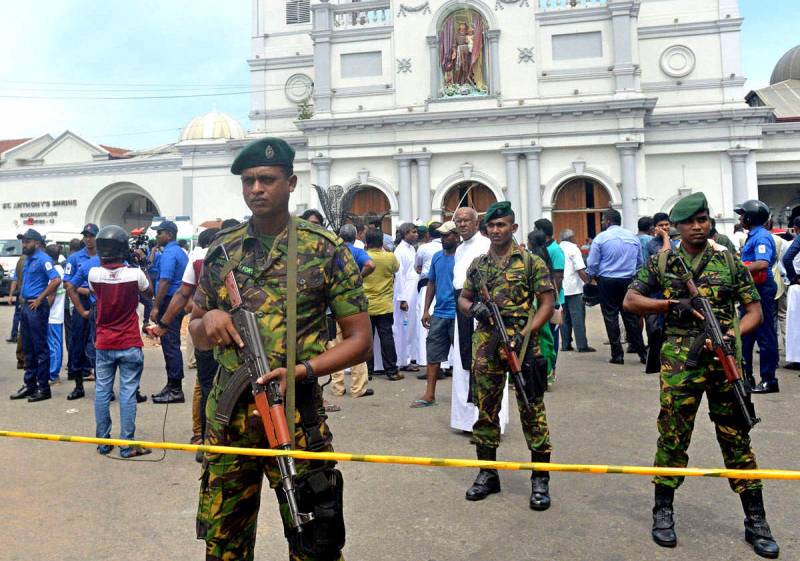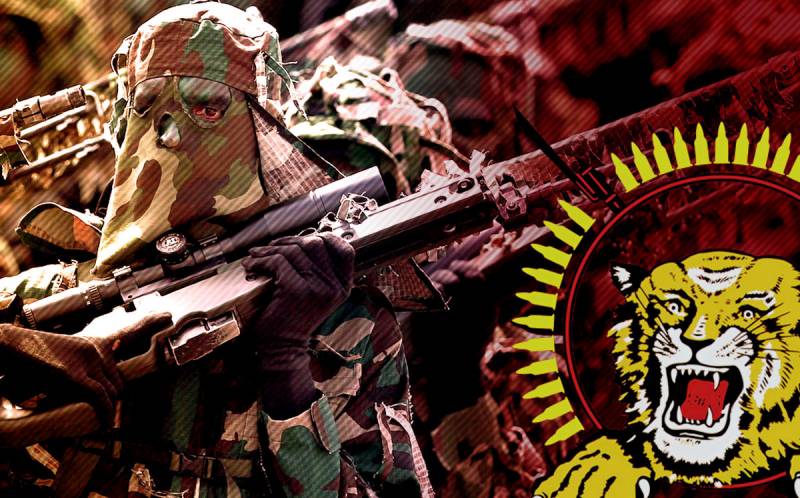IS instead of the Tamil Tigers? Who could blow up Sri Lanka
A series of terrorist acts in Sri Lanka on April 21, 2019 shocked the whole world. First, explosions rang out in Catholic churches and hotels, then in a residential complex in the suburbs of Colombo. According to noon on April 21 - more than 200 dead.
Sri Lanka translated from Sanskrit - "Glorious land." And indeed it is. Year-round summer and interesting monuments of history and culture attract millions of tourists from all over the world to this island state. Truth, политическая the situation in Sri Lanka has never been particularly stable. In the 1970s and 1980s, leftist groups fanned the water, then they were replaced by the Tigers of the Liberation of Tamil-Ilam.
In Sri Lanka, the majority of the population is Sinhalese - they are people of Indo-Aryan origin, most of them Buddhists by religion. Tamils live in the north of the country - this is the Dravidian nation, most of whose representatives inhabit the states of South India. Tamils profess Hinduism, but there are also a small number of Muslims among them.
Finally, in addition to Sinhalese and Tamils, there are also small communities of “Moors” in Sri Lanka - descendants of Arab immigrants, “burghers” - these are descendants of a mixture of local residents with Portuguese, Dutch and English colonialists. There are also Veddas - the indigenous inhabitants of the island, Australoids, of whom there are only a thousand and no influence on politics and the economy countries they do not render.
For a long time, the confrontation between the authorities of the country and the Tamil separatists was the main headache of Sri Lanka. The Tigers fought against the government of the country a real guerrilla war, not disdaining terrorist acts. They, by the way, killed the Prime Minister of India Rajiv Gandhi in 1991. But in the late 2000s, government forces still managed to neutralize the resistance of the Tamil separatists, and on May 18, 2009, their permanent leader Velupillai Prabhakaran was killed.
Even if Tamil terrorists decide to “rise from the dead,” it is unlikely that they would attack Catholic churches and hotels with foreign tourists. After all, the main goal of Tamil separatists has always been either government troops and institutions, or politicians who opposed Tamil independence.
It seems that the only version remains involvement in terrorist attacks from radical Islamist organizations. Explosions in Catholic churches are forcing a parallel with the attack on a mosque in New Zealand. But there was a lone terrorist acting there, and organizing eight strong explosions in churches and hotels was not enough for one “maniac”. Now, if an organization operates, then another thing.
But where did the Islamists come from in Sri Lanka? Muslims make up about 10% of the country's population. These are mainly Tamils. But it is not necessary that the attacks be carried out by representatives of the local population. There may be “stray” terrorists. Moreover, in South and Southeast Asia there is now an increase in terrorist activity. The Islamic State (banned in the Russian Federation) and other similar structures are trying to gain a foothold in Thailand, Myanmar, the Philippines, and India - wherever there are impressive Muslim minorities. Since Muslims do not dominate in these countries and feel oppressed, and the socio-economic conditions of life of the population leave much to be desired, it is not so difficult to find future terrorists among unemployed radical youth.
After the defeat of the Tigers of Liberation, the place of the main Tamil radical organization turned out to be vacant, and the demand for radicalism among Tamil youth remains. After all, living conditions do not change for the better. In 2016, the Sri Lankan authorities reported that 32 natives of the country joined the IS and went to war in the Middle East. Local traditional Muslim radicals condemn. After all, extremists spoil the image of Muslims in the eyes of other Sri Lankans, provoke the growth of negative attitudes towards Muslims by Buddhists, Christians, Hindus, although they have lived side by side in Sri Lanka for centuries.
It is known that the police chief Pujut Jayasundara in April 2019 warned of the threat of attacks on the office of the High Commissioner of India in Sri Lanka and on Christian churches. By the way, this office is located next to the very hotels that suffered as a result of the April 21 attacks. The police chief said that the attacks are being prepared by a local Islamist group.
But, as we see, the Sri Lankan security forces failed to take decent security measures and prevent attacks. And that raises even more questions. It is possible that the terrorists had accomplices in the police or special services, which allowed them to keep their plans secret.
Interestingly, so far no one has claimed responsibility for such a massive series of terrorist acts. But the point in the attacks is precisely to declare oneself. It turns out that the terrorists are waiting, studying public opinion? Or are they specially silent in order to intimidate even the Sri Lankans and the world community?
Sri Lanka translated from Sanskrit - "Glorious land." And indeed it is. Year-round summer and interesting monuments of history and culture attract millions of tourists from all over the world to this island state. Truth, политическая the situation in Sri Lanka has never been particularly stable. In the 1970s and 1980s, leftist groups fanned the water, then they were replaced by the Tigers of the Liberation of Tamil-Ilam.
Why does the Tamil Tiger version disappear
In Sri Lanka, the majority of the population is Sinhalese - they are people of Indo-Aryan origin, most of them Buddhists by religion. Tamils live in the north of the country - this is the Dravidian nation, most of whose representatives inhabit the states of South India. Tamils profess Hinduism, but there are also a small number of Muslims among them.
Finally, in addition to Sinhalese and Tamils, there are also small communities of “Moors” in Sri Lanka - descendants of Arab immigrants, “burghers” - these are descendants of a mixture of local residents with Portuguese, Dutch and English colonialists. There are also Veddas - the indigenous inhabitants of the island, Australoids, of whom there are only a thousand and no influence on politics and the economy countries they do not render.
For a long time, the confrontation between the authorities of the country and the Tamil separatists was the main headache of Sri Lanka. The Tigers fought against the government of the country a real guerrilla war, not disdaining terrorist acts. They, by the way, killed the Prime Minister of India Rajiv Gandhi in 1991. But in the late 2000s, government forces still managed to neutralize the resistance of the Tamil separatists, and on May 18, 2009, their permanent leader Velupillai Prabhakaran was killed.
Even if Tamil terrorists decide to “rise from the dead,” it is unlikely that they would attack Catholic churches and hotels with foreign tourists. After all, the main goal of Tamil separatists has always been either government troops and institutions, or politicians who opposed Tamil independence.
Could ISIS settle in Sri Lanka?
It seems that the only version remains involvement in terrorist attacks from radical Islamist organizations. Explosions in Catholic churches are forcing a parallel with the attack on a mosque in New Zealand. But there was a lone terrorist acting there, and organizing eight strong explosions in churches and hotels was not enough for one “maniac”. Now, if an organization operates, then another thing.
But where did the Islamists come from in Sri Lanka? Muslims make up about 10% of the country's population. These are mainly Tamils. But it is not necessary that the attacks be carried out by representatives of the local population. There may be “stray” terrorists. Moreover, in South and Southeast Asia there is now an increase in terrorist activity. The Islamic State (banned in the Russian Federation) and other similar structures are trying to gain a foothold in Thailand, Myanmar, the Philippines, and India - wherever there are impressive Muslim minorities. Since Muslims do not dominate in these countries and feel oppressed, and the socio-economic conditions of life of the population leave much to be desired, it is not so difficult to find future terrorists among unemployed radical youth.
After the defeat of the Tigers of Liberation, the place of the main Tamil radical organization turned out to be vacant, and the demand for radicalism among Tamil youth remains. After all, living conditions do not change for the better. In 2016, the Sri Lankan authorities reported that 32 natives of the country joined the IS and went to war in the Middle East. Local traditional Muslim radicals condemn. After all, extremists spoil the image of Muslims in the eyes of other Sri Lankans, provoke the growth of negative attitudes towards Muslims by Buddhists, Christians, Hindus, although they have lived side by side in Sri Lanka for centuries.
Police chief warned of local radicals
It is known that the police chief Pujut Jayasundara in April 2019 warned of the threat of attacks on the office of the High Commissioner of India in Sri Lanka and on Christian churches. By the way, this office is located next to the very hotels that suffered as a result of the April 21 attacks. The police chief said that the attacks are being prepared by a local Islamist group.
But, as we see, the Sri Lankan security forces failed to take decent security measures and prevent attacks. And that raises even more questions. It is possible that the terrorists had accomplices in the police or special services, which allowed them to keep their plans secret.
Interestingly, so far no one has claimed responsibility for such a massive series of terrorist acts. But the point in the attacks is precisely to declare oneself. It turns out that the terrorists are waiting, studying public opinion? Or are they specially silent in order to intimidate even the Sri Lankans and the world community?


Information